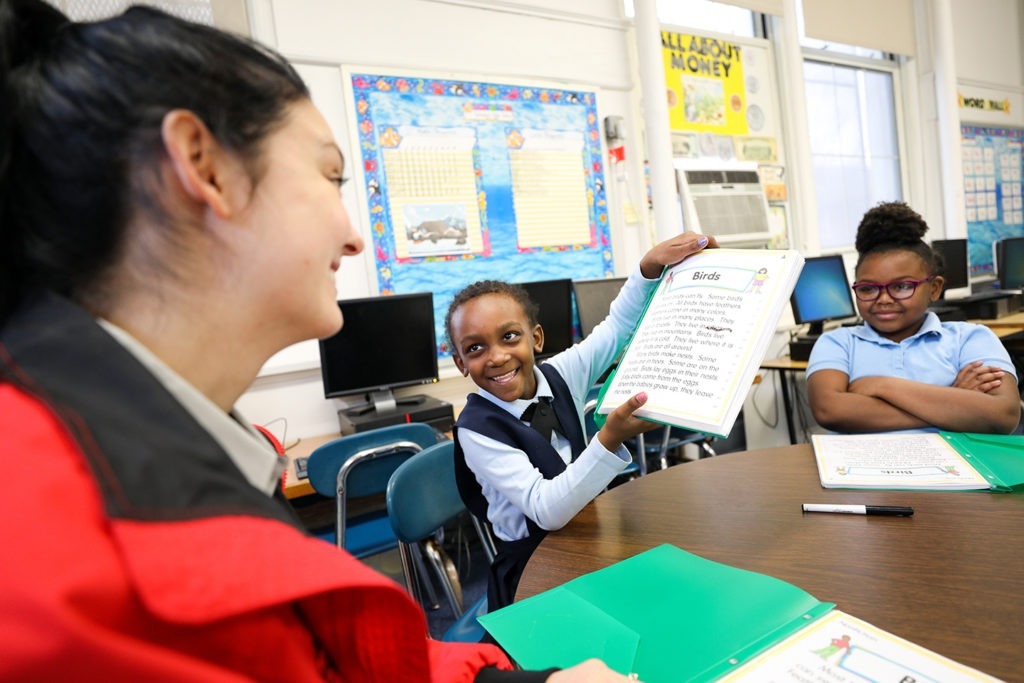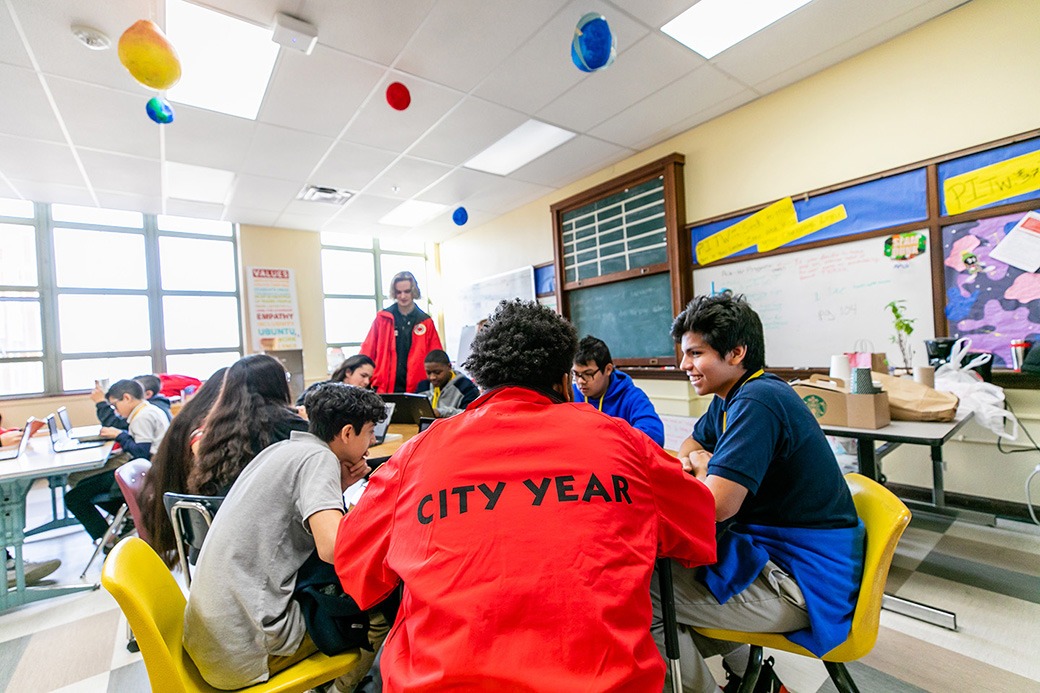How City Year AmeriCorps grow student literacy

Literacy is the ability to read and write, but what does growing student literacy for elementary, middle or high school students really look like? Oftentimes when we look back on our own learning journey, we can’t remember how we learned to read or write, so this question can feel daunting.
How City Year AmeriCorps members support students can vary across the 29 cities we serve in and that’s okay!
Growing student literacy can look different depending on grade level, school and who the tutor is. At City Year, our AmeriCorps members focus on building student confidence and literacy skills through small group work. Our student success coaches are trained to follow the guidance set by the school they serve in, suggestions from their partner teachers and the needs of their students.
What does a City Year literacy space look like?
AmeriCorps members serve as student success coaches. This means that at the core of their service is building relationships with students and helping them to grow academically, socially and emotionally by becoming a trusted mentor, tutor and role model—another caring adult in school they can rely on. When students feel seen and supported, they are more likely to feel comfortable asking for help and sharing their perspective, which is integral for learning.
Corps members work with their partner teacher to determine which students would benefit the most from additional support. Some sites offer a formalized tutoring system for growing student literacy, such as Leveled Literacy Intervention, while other sites may integrate school-based resources to reinforce learning.

How storytelling can help students build essential skills and competencies
Student development involves the intentional building of durable skills, identity formation and a sense of agency. What does that mean?
In literacy, durable skills refer to a student’s ability to read and make meaning of the text. To help students gain these skills, student success coaches work with students 1:1 or in small groups, helping them to strengthen their reading and comprehension skills and collaborating with classroom teachers to track their progress throughout the year.
The types of texts and stories that are selected can intentionally help students as they form their individual identities during childhood and adolescence by elevating role models, themes and cultural references that resonate with their own lives.
When students see their identities reflected in what they are reading, it contributes to their own identity formation, affirming who they are and supporting their agency to engage in the world in meaningful ways.
Melissa Morrison, a literacy coach for Edutopia, points out that “when teachers know about their students’ identities, it helps to not only build that trusting relationship but also to assist the student in generating ideas and being able to elaborate on [writing] their stories [as well].”
One way to build a sense of agency is to learn through storytelling. According to City Year’s National Literacy Director Allison Thompson “Literacy is about much more than just what we read. It’s an opportunity to be a storyteller—elevating the stories of others and writing our own. We want students to engage with something that brings them joy, while sharing who they are and what they can create.”
To give students the space to grow as storytellers, it’s important to get to know them as people, learn their interests and understand the areas they can grow in. This is where all the time and energy AmeriCorps members spend getting to know their students and building trust, consistency and rapport with them over time really pay off.
The five pillars of growing literacy and having fun
According to Thompson, “Regardless of what school or grade a corps member is supporting, City Year aims to focus on the five pillars of reading instruction: comprehension, fluency, vocabulary, phonemic awareness and phonics.” Some days may emphasize a particular skill more than others but overall, these pillars are essential for building student literacy.
There are a lot of opportunities to incorporate fun and creativity in literacy learning. Elementary and middle school students may be interested in dancing and singing along to language arts songs on Flocabulary. High school students might seek opportunities to express themselves through spoken word poetry.
Be intentional with your observations throughout the school day. Get to know your students, give them room to ask questions and incorporate their interests and ideas into your small group spaces.
Student learning is not all on you
It’s natural to feel a bit nervous when you first join City Year and wonder how you will learn how to successfully tutor and support students academically. Common things we’ve heard from student success coaches at the start of the service year are “I’m not a math person” or “how do you teach a student to read?”
Corps members serve on a team and are guided by impact managers. Some impact managers have served at the same school for several years and often have great insight on how to work with specific students. Other collaborators can include partner teachers.
“Always ask questions if you need support,” advises Thompson. “Our partner teachers are happy to answer AmeriCorps members’ questions related to lessons and can usually provide additional resources that support student learning.”
Supporting students is not a one-person job! There will always be a community of support for both students and corps members. City Year also has instructional coaches on staff who observe corps members throughout the year and give them feedback on how they can grow in facilitating or lesson planning.
To best support student learning, it is important to have a “Learner and Leader” mindset. “By having a Learner and Leader mindset,” says Thompson, “City Year empowers AmeriCorps members to become the facilitators of learning by listening, exploring, examining and understanding with students. This is crucial to breaking down the power dynamic between the adult and student thus helping to create a learning environment where all voices are heard and valued,”
Thompson encourages corps members to “lean in on your people. Lean in on your resources and remember that you’re not alone in this and it’s not all on you. Learning in this space is a team effort.”
Related stories
Every year, thousands of young people decide to join AmeriCorps programs for a year (or more!) of service, helping to...
Read more about Everything you need to know about returning for another year as a City Year AmeriCorps memberCity Year is committed to providing our AmeriCorps members with resources, opportunities and support that help them to achieve their...
Read more about Empowering Futures: City Year Baton Rouge’s Partnership with Bottom LineFatimah Abdulmateen takes service seriously. Fatimah served two years with City Year as an AmeriCorps member, making her an alum...
Read more about A City Year alum with a passion for service—both here and abroadThough this part of the City Year experience may be particularly challenging, it’s also normal! And we want you to...
Read more about The “mid-fall slump” in schools is real--here's what to expect















